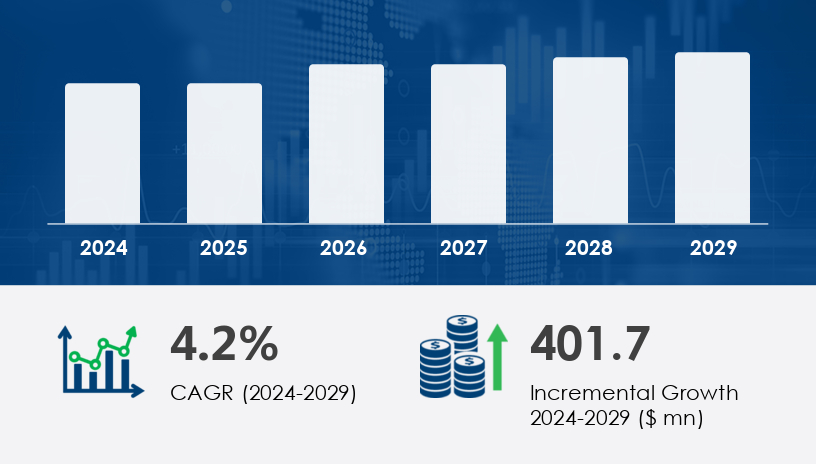The Middle East luxury furniture market is poised to grow by USD 401.7 million between 2024 and 2029, registering a CAGR of 4.2%, driven by economic expansion, luxury real estate development, and shifting consumer preferences toward sustainability.For more details about the industry, get the PDF sample report for free

In 2025, the Middle East luxury furniture market is more than a display of refined tastes—it’s a reflection of a region in transition. As high-net-worth individuals seek custom design, and luxury real estate thrives, the demand for opulent interiors surges. "We’re seeing luxury evolve from a status symbol to a lifestyle identity," remarks Senior Technavio Expert.
Market Size Projection (2025–2029): USD 401.7 million growth
CAGR: 4.2%
Growth Drivers: Rising office construction, eco-conscious consumer behavior, luxury tourism
Key Trend: Eco-friendly and tech-integrated furniture
Top Segment: Residential applications with custom and multifunctional furniture
Challenge: Fragmented regulations and rising furniture rental services
Get more details by ordering the complete report
Luxury is now a staple in corporate aesthetics. As the GCC's commercial real estate market expands—fueled by government-backed infrastructure projects and a growing presence of multinational firms—executive furniture, ergonomic luxury seating, and bespoke meeting tables are becoming the norm.
There’s a visible shift toward sustainable luxury—furniture crafted from recycled, refurbished, or ethically sourced materials. This movement aligns with GCC nations’ broader sustainability agendas like Saudi Vision 2030.
The residential segment dominates due to the increasing demand for functional luxury. From foldable beds to extendable sofas, space-saving design without compromising on luxury is trending.
Top Products in Demand:
Custom wood & leather furniture
Outdoor seating tailored for harsh climates
Ottomans, chaise lounges, and modular sofas
Designer side tables with gold leaf accents
While luxury showrooms and furniture galleries remain central to the buyer experience, online luxury furniture platforms are gaining traction—especially for repeat purchases and accessory shopping.
Trending Tactics:
Augmented reality apps for interior previews
Virtual furniture customization
Influencer-backed design showcases on social platforms
Material
Product Category
Geography
For more details about the industry, get the PDF sample report for free
From smart recliners to built-in charging consoles, tech is elevating comfort. Augmented reality is increasingly used for space planning and remote design consultations.
Islamic architecture influences modern luxury, evident in arabesque patterns, hand-carved wood, and Persian rugs. High-end consumers still gravitate toward artisanal mastery—reviving age-old craftsmanship traditions with modern relevance.
Customs, duties, and import regulations vary by country, creating friction for international players. Compliance delays can impact delivery timelines and brand reputation.
Top players such as Boca Do Lobo, Poltrona Frau, Minotti SpA, and LVMH are investing in the region via flagship stores and strategic partnerships.
While demand is stable, supply chain volatility—including shipping delays and rising freight costs—can hinder project timelines, especially for custom furniture pieces.
Furniture rental platforms are increasingly attractive to younger expatriates and digital nomads. While these services lack bespoke options, their flexibility and cost savings present a potential disruptor to traditional retail.
Get more details by ordering the complete report
The Middle East luxury furniture market is experiencing robust growth, driven by rising disposable incomes, a booming real estate sector, and increasing demand for luxury furniture in premium homes and commercial spaces. Key product categories include lounge chairs, ottoman benches, designer sofas, coffee tables, dining tables, kitchen tables, and dining chairs, all designed to meet both functional and aesthetic expectations. The market also caters to a niche segment of outdoor seating and bedroom furniture with a focus on high-end furniture and luxury lighting. The rising preference for wood furniture, leather furniture, metal furniture, and glass furniture highlights the use of high-quality materials and attention to aesthetic appeal and durable furniture. Meanwhile, the growing prominence of eco-friendly furniture and multifunctional furniture is shaping new trends in home furnishings, while designer boutiques, specialty stores, and luxury showrooms continue to serve as key distribution channels across the region
Localize Inventory: Maintain micro-warehouses across key cities to streamline delivery.
Leverage Tech: Adopt AR/VR for personalized design consultation.
Navigate Compliance: Employ region-specific legal teams to decode import regulations.
Build Alliances: Partner with luxury hotels and interior design studios.
Promote Sustainability: Certify eco-friendly credentials prominently on all marketing assets.
As luxury becomes more experience-driven, the market will reward brands that blend cultural identity, ethical sourcing, and tech-enhanced personalization.
For more details about the industry, get the PDF sample report for free
The research analysis of the Middle East luxury furniture market emphasizes the rising inclination toward personalized furniture and bespoke furniture that meets the distinct tastes of affluent consumers. Innovations such as smart furniture, automation furniture, and digitalized furniture are gaining traction, particularly in technologically advanced residential and coworking spaces. In the sleep solutions segment, demand for luxury mattresses, including organic mattresses, hybrid mattresses, memory foam, and adjustable beds, is steadily rising. Consumers are also investing in premium accessories, luxury decor, and custom furnishings that enhance the ambiance of office furniture, luxury rentals, and upscale residences. The market is increasingly shaped by global trends, with designer chairs and custom furnishings integrating seamlessly into luxury showrooms and retail formats. Finally, the emphasis on sustainable practices and unique design aesthetics ensures continued interest from discerning customers seeking exclusivity and value.
The Middle East luxury furniture market is on a promising growth trajectory, shaped by innovation, affluence, and sustainability. With USD 401.7 million in expected growth through 2029, strategic entry into this market requires more than aesthetic appeal—it demands cultural fluency, technological integration, and regulatory savvy.
Safe and Secure SSL Encrypted